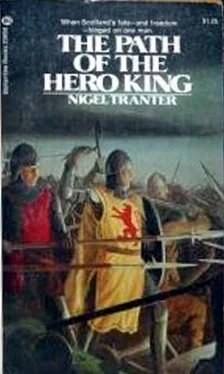Now, Sire-now! Gilbert Hay cried, at Bruces side.
Down on them now, and we shall have them before their rear comes up.
No, the King said shortly.
Our horses would be of no more avail down there than are their own. Amongst the trenches or the bogs. Wait. The others know their tasks.
It was evident that none of the van was in fact going to get as far as the third trench, and therefore the schiltroms. For now, between the ditches, Edwards and Campbells men were breaking off their contests with the MacDougalls and streaming in amongst the milling and disorganised cavalry and dismounted riders. James Douglas was breaking up the central schiltrom and sending its 200 men off round the flanks to assist in dealing with the MacDougalls.
They cast away their pikes in favour of swords and dirks as they ran. The other two formations stood unmoving meantime, like their monarch above.
Possibly that steady waiting contributed something to the battle, nevertheless. The sight of it may have been the last straw, the final influence to convince the enemy, the van at least, that the day was without profit. At any rate, the tide turned-and once turned became a flood. In only a few moments, all who could escape were surging back. Many were unable to cross the horror of that first ditch, and fell to the Scots swords there. But the majority went streaming westwards.
And because the bogs restricted them to the firm ground, the horde of fleeing men and beasts could not do other than come into headlong confusion with the still advancing second line, under the Lord Percy. Perhaps with another leader the day might yet have been saved-for this reserve host still outnumbered the Scots. But Henry Percy was a cautious man, more of a schemer and administrator than a soldier. The sight of the disaster ahead, the still un blooded Scots schiltroms beyond those ghastly trenches, and the panic effect of the fleeing men on his own ranks and consequent disorder, decided him. His trumpets sounded the retiral.
After that it was devil take the hindmost. The Lornmen on the flanks saw themselves deserted, and broke away, to escape if they might through the morass. There was only the fighting of individuals, selling their lives dearly. Flight and pursuit were the order of the day. Bruce and his four-score remained unemployed, unnecessary.
Gods mercy-a victory, Sire! A victory! Hay exclaimed.
Of a sort! He sounded less than elated.
And we have not struck a blow!
The King drew a great breath.
A victory, yes. A victory, not of arms and skill and courage, but of low cunning. Another brigands victory, Gibbie. My answer to Pembrokes challenge. But … I thank God for it, nevertheless. One day, perhaps, we will fight these English in the field, man to man, and beat them fairly. But that day is not yet-not for long. Come-we will go down and see if we can find de Valence. At least I have wiped out the shame of Methven. When he struck us by night…
They did not find the earl amongst the slain. Someone said that he had been seen clambering out of that first trench, known by the blue-and-white of his handsome surcoat and helmet plumes, limp in his heavy armour to find a riderless horse, and ride back and away. Some notable men were amongst the dead, and more would be deep under the bodies in that ditch. None appeared to be amongst those with whom Bruce had personal accounts to settle. A report did spoil the muted triumph of the victory-the fact that more than one had seen his own nephew, Sir Thomas Randolph, his mothers grandson by her first husband, prominent in the English van, easily identified by his great height, as well as his arms and colours. He had been taken prisoner at Methven, and ransomed, one of the very few spared by King Edward. Now it was to be seen why.
Bruce gave orders to stop all pursuit of the fleeing enemy. The Earl of Gloucester, with the main body of English infantry from Galloway, was not far away. They were not finished yet. If these could be kept from joining Percy … The hunting-horn sounded the recall, and reassembly.
Edward Bruce was, as ever, one of the last in.
We have them running! he cried.
Running like whipped curs! Now they know who is master in Scotland!
Master, brother? The King asked.
I am not yet master of this my own Ayrshire! And Ayrshire is but one county of Scotland. We have met the English in one field, and prevailed. By our wits. That is all. And Edward Plantagenet sits at Carlisle and musters his hundreds of thousands. Let us never forget that man-for he will not forget us!
He is dying…
I should still fear Edward, even were he dead! Such hatred will
survive even the grave, I do believe Chapter Ten
Almost against his better judgement Bruce was besieging the town and castle of Ayr -after a fashion. It was rather ridiculous in fact, with the numbers of properly armed and disciplined men he had at his disposal, and with no sort of siege equipment. But both the English themselves and his own subjects seemed to expect it, and he was in something of a quandary as to what to do next, anyway.
So he made pretence of encircling Ayr -and was ready to be up and away at short notice.
After Loudoun Hill he had managed to trap his cousins husband Ralph de Monthermer, Earl of Gloucester, and the mass of English infantry-the same who had timeously sent him the spurs and the shilling that night in London a year and more before, and so undoubtedly saved his life from Comyns betrayal and Edwards vengeance.
There, in the hills behind Cumnock, there had been a great slaughter, by night, when the English and Welsh archers could not see to draw on their foes. The darkness had aided escape also, of course, and Gloucester himself, with large numbers of his force, had fled here to Ayr, to join Percy therein. Pembroke had apparently fled from Loudoun Hill in the other direction, for Bothwell.
But Clifford, somewhat in disgrace no doubt, had been bringing up the English rear and baggage, from Minnigaff and the Cree, and getting word of Gloucesters disaster, had avoided all engagement and likewise made hurriedly for Ayr. So that there was now a large if somewhat demoralised force in the town, many thousands strong, including two of Bruces chief est foes.
But there was more than these in Ayr. There were some thousands of townsfolk, as well as men thronging there from all Carrick, Kyle and Cunninghame. Their Kings victories, small as they were, at last were beginning to rouse the people, to give them hope, to stir up young men to join their liege lord in arms. The hostility of these, with the citizenry, undoubtedly preoccupied the invaders, and added to the siege-like atmosphere.
Indeed daily the numbers of Bruces force increased hearteningly.
Few great men as yet committed themselves-although with so many of these dead, prisoners or in exile, this was scarcely to be wondered at; while many had always been in the Comyn camp. But the sons of this laird or that, with a dozen or a score of men, variously armed, came riding in every day, as well as great crowds of master less common folk. Feeding, marshalling and controlling these was an ever-growing problem, and took up much of the time of Bruce and his little band of lieutenants. That this could better be achieved in the fertile and populous lowlands surrounding Ayr, than in the wilderness where he would have preferred to be, was another reason why the King lingered, though warily, in his sham siege-while he kept his rear free for quick retiral into the hills.
He had taken up his residence, meantime, in his cousin Christian of Carricks house of Newton-upon-Ayr, Turnberry still being held strongly against him, and was able to live in more comfort than he had known for long. It was pleasant, of an evening, to dine well here, and to contemplate Clifford and Percy, only a mile or two away, tightening their belts-for food was known to be getting very scarce in Ayrs citadel these June days-although undoubtedly those two would be the last to starve.
Читать дальше












